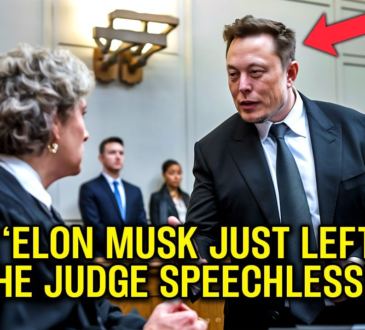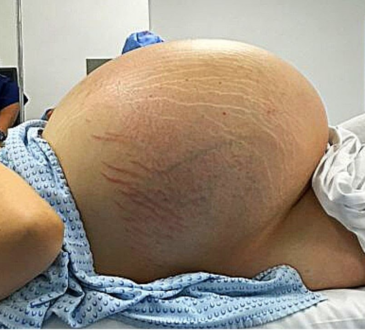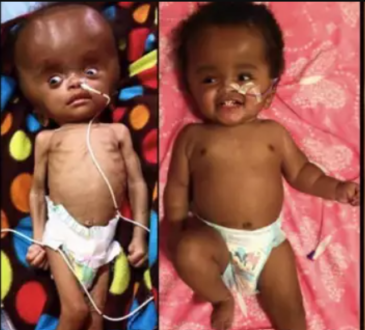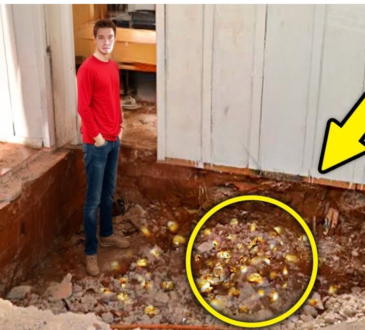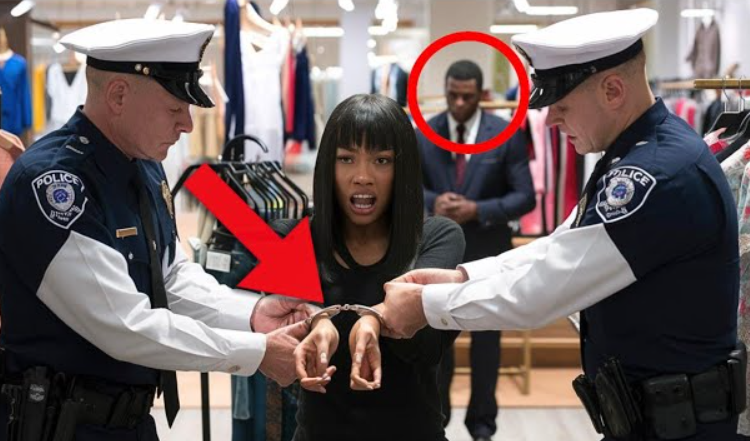
Clarice Johnson started the day like any other, immersed in the routine of the luxury clothing store where she had worked as a manager for over five years. The store, located in an upscale neighborhood of Washington D.C., was frequented by demanding high-end customers. Clarice always stood out for her dedication and professionalism, earning the respect of her colleagues and the loyalty of the clients.
That morning, the store was busy. Clarice was in the back, organizing the new collection that had just arrived, when she heard a heated argument in the customer area. She hurried to see what was happening and found an influential customer, socialite Miranda Collins, accusing a young employee of theft.
Clarice, with her usual calm, intervened. “What seems to be the problem here, Mrs. Collins?” she asked, trying to diffuse the situation.
Miranda, with a haughty and disdainful look, pointed to the young employee who was visibly scared. “I saw this girl put a piece of clothing in her bag,” Miranda exclaimed, her voice full of accusation.
Clarice looked at the employee, who was shaking her head and denying the accusations, her eyes filled with tears. “Mrs. Collins, I assure you this must be a misunderstanding. Let’s check the security cameras to clarify everything,” Clarice suggested.
However, Miranda was not willing to wait. She looked directly at Clarice, her tone becoming even colder. “This isn’t the first time I’ve noticed something strange happening in this store, and you, as the manager, must be responsible,” she said, crossing her arms.
Before Clarice could respond, two store security guards, alerted by the situation, approached. Miranda then did something unexpected: she pointed directly at Clarice. “Maybe you’re the thief here,” she said, her voice dripping with venom. “You people always protect each other, don’t you?”
Clarice felt the shock of the accusation. Miranda’s words not only accused her unjustly but were also loaded with a prejudice Clarice knew all too well. For a moment, the entire store seemed to fall silent, all eyes fixed on the unfolding scene.
“This is absurd,” Clarice responded, trying to maintain her composure. “Let’s handle this professionally. Please follow me to the security room so we can review the footage.”
Nevertheless, Miranda insisted that the police be called immediately. Reluctantly, Clarice agreed, trusting that the truth would come out. As they waited, the atmosphere in the store was tense, with whispers and looks of distrust being cast toward Clarice.
When the police arrived, the situation took an even darker turn. Without any evidence, solely based on Miranda’s word, Clarice was taken into custody on suspicion of theft. The handcuffs on her wrists were a painful symbol of an injustice that Clarice knew was motivated purely by prejudice. On the way to the police station, Clarice kept her head held high, her mind already working on how to prove her innocence. She knew she had a powerful ally in her husband, Dr. Ethan Johnson. However, she chose not to reveal her connection to him at that moment, hoping that the truth alone would be enough to free her.
At the station, Clarice was treated with coldness and suspicion. The interrogation was harsh, with the officers insinuating that she was involved in a larger scheme. Clarice, maintaining her dignity, calmly answered all questions, denying any involvement in crimes. Meanwhile, news of Clarice’s arrest began to spread. Journalists, always on the lookout for a sensational story, quickly picked up the case—a black woman unjustly accused of theft in a luxury store was the type of story that attracted public attention.
Ethan was at a medical conference in New York when he received the news. Without hesitation, he took the first flight back to Washington D.C. He knew he needed to be by his wife’s side and use all his influence and resources to help her.
Back at the police station, Clarice waited, feeling slightly more hopeful. She knew Ethan was doing everything he could to help her, and most importantly, she knew she was not alone. Ethan arrived at the police station with the determination of a man who had faced great adversities. He knew the American justice system and was aware of the prejudices that still permeated many of its institutions. The sight of Clarice being led away in handcuffs and the news of the injustice she was suffering filled him with anger but also with a fierce desire to fight for the truth.
The moment he entered the station, Ethan’s presence immediately made an impact. The officers knew who he was. After all, he was not only a renowned doctor but also a respected public figure for his contributions to medicine. He didn’t need to raise his voice to demand that Clarice be treated with the respect she deserved—a firm look and a few measured words were enough. “I want to see my wife now,” he said calmly but with the authority of someone used to handling high-pressure situations.
One of the officers, clearly intimidated, indicated the interrogation room where Clarice was being held. Ethan entered, finding her sitting in a chair, still handcuffed but with her head held high and a defiant look in her eyes.
“Clarice, my love,” he said softly, kneeling beside her. “I’m here. We’re going to get through this together.”
Clarice smiled at him, a smile that spoke more than words could express. Ethan knew that despite everything, she was a strong and resilient woman. He loved her for that, among so many other reasons.
“Ethan, they have nothing against me except for that woman’s word,” Clarice said, her voice firm. “But this is about more than just a false accusation; it’s about the prejudice we face every day.”
Ethan agreed, feeling the truth in her words. He knew that their fight wouldn’t just be against a specific accusation but against an entire system that often failed to treat everyone equally. After a few minutes, one of Ethan’s lawyers arrived. Daniel Crawford was one of the best in his field, known for his ability to handle difficult cases and his dedication to fighting for justice. He entered the room, greeted Clarice and Ethan, and immediately began examining the details of the case.
“Clarice, can you tell me exactly what happened in the store?” Daniel asked, his voice calm and professional.
Clarice explained everything from the beginning—Miranda’s sudden accusation, the lack of evidence, and the obvious prejudice that permeated the entire situation. Daniel listened carefully, taking notes and planning the defense strategy.
“We’ll get the security camera recordings from the store,” Daniel said. “And we’ll need witnesses who can attest to your character and behavior at work.”
Ethan nodded, already thinking about how to mobilize their network of contacts. He knew they would need all the evidence they could get to fight the injustice. Meanwhile, the media continued to cover the case intensely. Journalists gathered outside the police station, waiting for any updates. Social media buzzed with divided opinions—some defending Clarice while others condemned her based on ingrained prejudices.
Ethan and Daniel stepped out of the station to speak to the press. Clarice watched through the window as her husband positioned himself in front of the cameras. “My wife is innocent,” Ethan declared, his voice firm and clear. “She is being unjustly accused based on prejudice and lack of evidence. I trust the justice system to correct this situation, but I also trust the truth, and the truth is that Clarice did not commit any crime.”
Journalists fired questions, but Ethan maintained his composure, answering only what was necessary. He knew that every word spoken there could influence public opinion and consequently, Clarice’s trial. Inside the station, Clarice waited, feeling a bit more hopeful. She knew Ethan was doing everything possible to help her, and most importantly, she knew she was not alone.
The following days were intense. Ethan, Daniel, and the team of lawyers worked tirelessly. They obtained a copy of the security recordings but discovered that a crucial part of the video was missing, apparently deleted. This only increased suspicions that someone was trying to frame Clarice. Ethan used his network of contacts to pressure the store administration to cooperate. Finally, one of the store employees who sympathized with Clarice brought an additional copy of the video he had saved as a precaution. The recording clearly showed that Clarice had not committed any theft. On the contrary, she was helping another customer at the time Miranda claimed to have seen the theft.
With this new evidence, Daniel prepared Clarice’s defense. In addition, several colleagues and loyal customers offered to testify on her behalf, attesting to her character and honesty. Clarice’s trial attracted
a lot of attention. The courtroom was filled with journalists, civil rights activists, and curious onlookers. Outside, protests formed, with people demanding justice for Clarice and denouncing the racial prejudice she was facing.
On the day of the trial, Clarice entered the courtroom accompanied by Ethan and Daniel. She was nervous but also determined to prove her innocence. Ethan held her hand, transmitting strength and support. The prosecutor presented the case, relying solely on Miranda Collins’ testimony. When it was the defense’s turn, Daniel stood up and presented the security recordings, as well as the character witnesses.
“Ladies and gentlemen of the jury,” Daniel began, his voice firm and clear, “what we are seeing here is a clear case of prejudice and injustice. My client, Clarice Johnson, was accused without evidence and treated in an unacceptable manner. The security footage proves her innocence, and the witnesses here attest to her impeccable character.”
Miranda was called to the witness stand. During cross-examination, her contradictions became evident. Daniel questioned her motives, bringing to light the possible animosity due to Clarice’s position in the store. It became clear that Miranda harbored prejudices that influenced her actions.
“Mrs. Collins,” Daniel said, his voice calm but incisive, “did you know that the accusation you made could ruin an innocent person’s life?”
Miranda tried to defend herself, but her responses were evasive and contradictory. The jury, as well as the spectators, began to see the truth: Clarice was innocent and was being targeted by injustice.
Finally, after an intense day of testimonies and arguments, the jury retired to deliberate. Clarice and Ethan waited anxiously, holding on to each other. When the jury returned, the verdict was announced: Clarice was found not guilty of all charges. The courtroom erupted in applause and celebrations. Clarice, emotional, embraced Ethan, feeling the weight of the injustice finally lift. She was released immediately, and the media quickly broadcasted the news of her innocence.
Outside the courtroom, Clarice and Ethan were greeted by a crowd of supporters. Journalists requested interviews, and civil rights activists celebrated the victory. Clarice, her voice choked with emotion, thanked everyone who had supported her.
“This victory is not just mine,” Clarice said. “It is a victory against prejudice and injustice. It is proof that together we can fight and win.”
Ethan, by her side, held her hand, proud and relieved. He knew that their fight did not end there. The experience they had lived ignited a flame of purpose and determination in both of them.
In the following days, Clarice and Ethan continued to make headlines. They decided to establish a foundation to help other victims of injustice, using their influence and resources to make a difference. The foundation quickly gained support, and Clarice became a significant voice in the fight against racial prejudice.
The luxury clothing store, pressured by public opinion and Clarice’s lawyers, issued a public apology and offered substantial compensation, which Clarice decided to use to fund the foundation. Clarice and Ethan, now closer than ever, dedicated themselves to helping others and fighting for justice. The traumatic experience they had lived through transformed into a positive force, guiding them toward a future where they could make a difference.
With the foundation established, Clarice and Ethan dedicated their lives to fighting for justice and equality. They used the traumatic experience as a catalyst to make a difference in society. The foundation, now known as the Clarice Johnson Foundation, provided legal and psychological support to victims of prejudice and injustice, as well as promoting awareness campaigns about racial equality. Clarice became a public figure, frequently invited to speak at conferences and events about civil rights. Her story of resistance and overcoming inspired many, and she used her voice to advocate for those who couldn’t defend themselves. Ethan, in turn, continued his work as a doctor but now also dedicated himself to supporting the foundation, participating in projects involving mental health and the well-being of injustice victims.
One of the first major cases the foundation took on was that of Marcus Williams, a young black man unjustly accused of theft under similar circumstances to Clarice’s. The foundation’s legal team, led by Daniel Crawford, investigated the case thoroughly and discovered that Marcus had been the victim of a police corruption scheme. With the support of Clarice and Ethan, they managed to prove Marcus’ innocence and expose the scheme, resulting in several arrests and a reform in the local police department.
The victory in Marcus Williams’s case solidified the foundation’s reputation and attracted more support and donations. Clarice and Ethan realized that although they had a lot of work ahead, each victory brought significant change and a step closer to a just and equal society.
During an award ceremony where the foundation was honored for its contributions to social justice, Clarice gave an emotional speech.
“A little over a year ago, I was sitting in a cell unjustly accused of a crime I didn’t commit. Today, I stand here surrounded by people who believe in truth and justice. Our fight is far from over, but every step we take is a step towards a better world. We must continue to fight, not just for ourselves, but for all people who face injustices every day.”
A standing ovation followed Clarice’s words, and she knew her words echoed beyond that hall. They resonated in hearts and minds, inspiring a new generation of activists and civil rights advocates. The foundation continued to grow, expanding its services to other cities and states. Clarice and Ethan worked tirelessly but also found time for themselves, further strengthening their relationship. They knew that to continue the fight, they needed to be united and support each other.
One day, while walking in the park, Ethan stopped and looked into Clarice’s eyes. “We’ve accomplished so much, Clarice, and I couldn’t have done it without you. You are the strongest and most courageous woman I know, and I’m proud to be by your side.”
Clarice smiled, feeling the love and admiration from Ethan. “I couldn’t have done it without you either, Ethan. Together we’re stronger, and as long as we’re together, I know we can face anything.”
Over time, Clarice’s story was adapted into a documentary, which won several awards and reached an even larger audience. The documentary not only highlighted Clarice and Ethan’s fight but also brought to light other stories of injustice and prejudice, showing the importance of the foundation’s work. The Clarice Johnson Foundation became a symbol of resistance and hope, and its impact was felt across the country. With each person they helped, each life they transformed, Clarice and Ethan felt they were honoring the fight they had started together.
Finally, on a sunny afternoon, Clarice and Ethan were invited to a ceremony at the Capitol, where they received a special honor from the government for their contributions to social justice and racial equality. The president, while presenting the medal to Clarice, spoke about the importance of her fight and the impact of her work.
“Clarice Johnson, you have transformed your personal experience into a force for the common good. Your dedication to justice and equality is an example for all of us. On behalf of the nation, I thank you for your courage and unwavering commitment to the truth.”
Clarice accepted the medal with humility but also with a deep sense of accomplishment. Looking at Ethan, she saw the same feeling reflected in his eyes. They knew there was still much to be done, but at that moment, they could celebrate the victories they had achieved together.
As the sun set over Washington D.C., Clarice and Ethan walked hand in hand, ready to face whatever the future held. They had turned pain into purpose and were determined to continue fighting for a more just and equal world.
And so, Clarice Johnson, who was once unjustly accused of theft, became a symbol of resistance and hope, showing the world that truth and justice always prevail.

